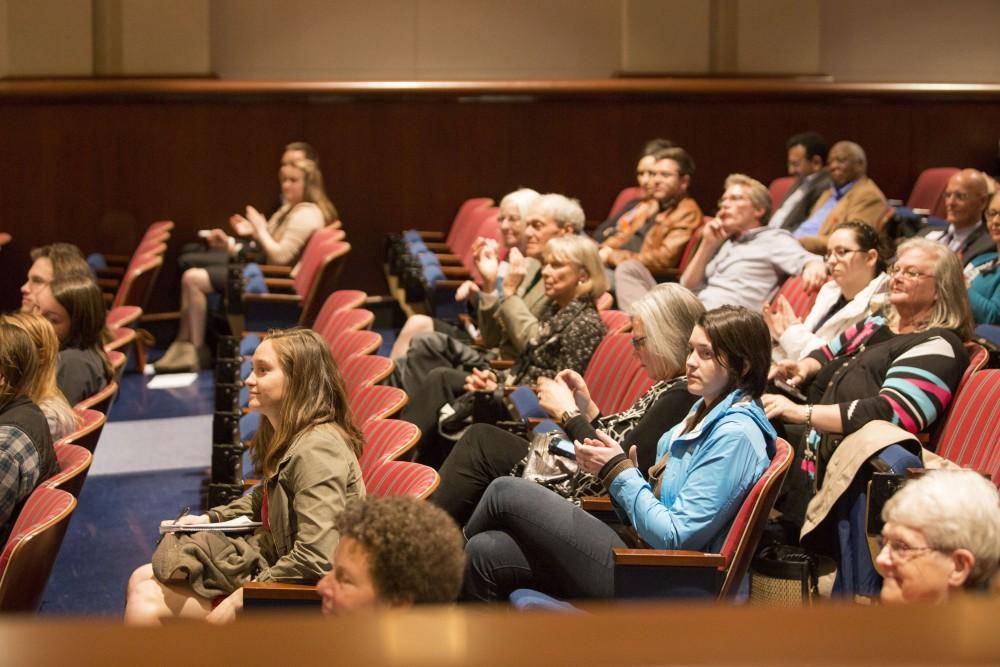Memorial lecturer advocates for intersectionality in interfaith work

GVL / Sara Carte – The audience claps for Rev. Jennifer Bailey at the Kaufman Interfaith Institute: Sigal Lecture in the Pew Loosemore Auditorium on Wednesday, Mar. 30, 2016.
Apr 4, 2016
Rev. Jennifer Baily delivered a message of interfaith acceptance to an audience of religious leaders, students and guests at the Grand Valley State University DeVos Center on March 30.
“”Racial and Interfaith Justice: A New Vision for Leadership at the Intersections” was part of the Phillip Sigal Memorial Lecture. This is a biannual event to honor Rabbi Sigal, an early leader of the interfaith movement in Grand Rapids. The event is hosted by the Kaufman Interfaith Institute and the Interfaith Dialogue Association, two West Michigan groups promoting interfaith relations.
Baily is an ordained minister in the African Methodist Episcopal (AME) Church. She is also the founder and executive director of the Faith Matters Network, a multi-faith organization that promotes leaders and storytellers. Besides being a religious figure, Baily has done activist work with several groups including the Bill Emerson Hunger Fellows, Community Food Advocates, and Black Lives Matter.
During her talk, Baily stressed the idea of accompaniment, when different religious and racial groups come together to support and understand each other.
“Someone who doesn’t look like you, who may not share your core beliefs, but from the very wells of their being, from the very wells of tradition, believes wholeheartedly that we as a people, are each other’s business,” Baily said.
She talked about her own experience and how racial and religious persecution influenced her childhood.
“One of my earliest experiences in my school was being told that I was dirty, because why else would my skin be brown?” Baily said. “That early experience of direct racism endowed me with a deep sense of empathy.”
Baily also talked about more recent examples of persecution in her life, using the terrorist attacks on Sept. 11 as an example.
“I saw on (television) that people that were brown like me were suddenly our enemies, I thought the one place that I would hear a message of hope and unity would be church,” Baily said. “(At church) I heard that Muslims were our enemies, that there was something fundamentally wrong with them. That was not the gospel I knew, that was not the gospel I felt in my heart.”
As she grew in her religious life, she began asking questions and meeting new people, and gained new perspectives on other religions.
Baily said the country is in an age of growing racial and religious diversity, and it can either come together and be there for fellow Americans, or be split apart by differences.
She said the work of Faatimah Knight, a Muslim woman who raised money to help rebuild black Christian churches in the South that were burned down as a result of racial violence, is a perfect example of the value of accompaniment.
“Knight decided there was nothing more sacred she could do than to raise money to rebuild black churches in the South,” Baily said. “And she did, over $75,000. That is the embodiment of an ethic of accompaniment.”
Katie Gordon, program manager of the Kaufman Interfaith Institute, said Baily was invited because her beliefs are what the memorial lecture is all about.
“I think Jen represents what the future of interfaith is,” Gordon said. “The model of interfaith leadership is going to be one rooted in this concept of intersectionality, where you bring the fullness and complexity of your identity to the table.”
For more information about the Kaufman Interfaith Institute, visit www.gvsu.edu/interfaith.























